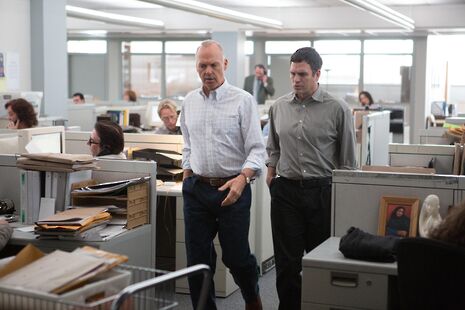Film: Spotlight
‘A love-song to investigative journalism’

It is only natural to suspect movie posters of being hyperbolic propaganda machines, sensationalised to advertise a product. Tom McCarthy’s Spotlight, however, is a rare example of a film whose subject lives up to its advertising. It tells “the true story behind the scandal that shook the world”: the journalistic exposé of the systematic child sex abuse in the Boston area by Roman Catholic priests. It depicts the Spotlight team at The Boston Globe, a group of investigative journalists who spend months at a time delving into local scandals – only to discover one which was to have huge repercussions both in Boston and across the world. With a fantastic ensemble cast led by Michael Keaton as section editor Walter “Robby” Robinson, Spotlight is a spine-tingling depiction of one of the most wide-scale sexual scandals of our time.
This film is not an attack on the Church, nor does it narrate one. Spotlight is a love-song to investigative journalism. The audience is taken through the process of inquisitiveness to fact-finding to pattern-spotting in a way that is comparable to a murder mystery where we know whodunit. The tension comes from the David and Goliath nature of the battle in question: a regional newspaper takes on the gargantuan institution of Rome. The limited but much-appreciated moments of light relief come from the incredulous prospect that “you’re going to sue the Catholic Church!?” It is rewarding to see how the initial response, an embarrassed recognition of inevitable failure, changes to a confident affirmation of their journalistic rigour and their belief in the power of hard evidence. Mark Ruffalo’s portrayal of Spotlight’s leading journalist, Mike Rezendes, is entirely human: we see him thrive on the brink of a journalistic discovery, before being totally enraged and disorientated by the monster of a story that he finds.
Ultimately, Spotlight hinges on institutional secret-keeping. The conscious and legally-binding effort of the Church is paired with a less mindful yet equally damaging cover-up exercised by the entire community. The audience searches for a scapegoat to blame for allowing this story of mass abuse to fall under the radar. The questionable reliability of the charity campaigner is proved to be legitimate; the glib, corporate, and seemingly uncooperative lawyer in fact attempted to expose the abuse years earlier.
It is a sad moment when Robby, the man tasked with exposing the story and the audience’s friend throughout the film, admits that he, too, must bear some responsibility for participating in the culture of silence. Robby is the everyman of Boston: when he accepts his role in the scandal, so must the city. Boston is described as the “biggest small town in America”: skeletons in closets are common knowledge. It took an outsider, the out-of-towner Marty Baron (played by Liev Schreiber), to pierce through the thick skin of self-denial and tear out the scandal lurking underneath.
The initial estimate of thirteen abusive priests in the Boston area was shocking enough; it is a stomach-turning moment when an expert reveals that a more accurate estimate would be closer to ninety. The range of reactions found within the Spotlight team – the sympathetic ear of Rachel McAdams’s Sacha Pfeiffer, the bumbling anger of Brian d’Arcy James’s Matt Carroll – make this film an exploration of civilisation pushed to its limits. Visually, this film is inherently unglamorous: the HQ of the operation is in a grey, basement office, filled with off-white shirts, limp plants and dirty mugs. Perhaps that explains the distinct lack of successful journalistic thrillers since 1976’s All the President’s Men, depicting the exposure of the Watergate conspiracy. Despite the unremarkable setting, Spotlight tells a gripping story: it has stomach-turning bombshells, truly moving struggles and a satisfying reassurance of the power of a free press.
 Features / How sweet is the en-suite deal?13 January 2026
Features / How sweet is the en-suite deal?13 January 2026 Comment / Will the town and gown divide ever truly be resolved?12 January 2026
Comment / Will the town and gown divide ever truly be resolved?12 January 2026 News / 20 vet organisations sign letter backing Cam vet course13 January 2026
News / 20 vet organisations sign letter backing Cam vet course13 January 2026 Arts / Fact-checking R.F. Kuang’s Katabasis13 January 2026
Arts / Fact-checking R.F. Kuang’s Katabasis13 January 2026 Music / Inside Radiohead’s circle13 January 2026
Music / Inside Radiohead’s circle13 January 2026









